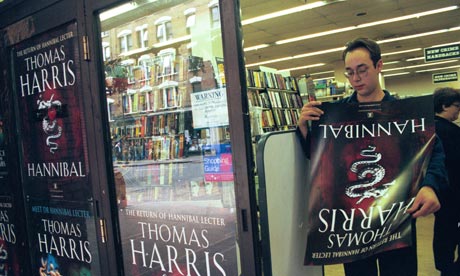
For many years my local corner shop displayed a large sign in its window telling local residents to "use us or lose us!" It always looked a rather toothless threat to me. After all, if I didn't use them, what difference would it make to me if they weren't there? And surely a corner shop, one that had been there for years, would have enough customers to survive without recourse to such an apocalyptic warning? But it didn't and was soon converted into flats.
This community shop was destroyed not so much by the pressures of the supermarkets or people's commuting patterns, but simply by customer apathy. It's something to think about as crime writers and readers across the world mourn the imminent passing of Maxim Jakubowski's celebrated Charing Cross Road bookshop in London, Murder One.
Apathy is a strange word to connect to a bookstore that thrives on passion. It's noticeable when you walk through the door, when you speak to the friendly, knowledgeable staff, when you look at the shelves and see the vast range of titles on offer. This isn't your regular kind of bookstore: the first time I visited I spent a whole lunch break looking up and down, from floor to ceiling from table to table; it was an hour that changed my perception of both crime writing and of bookselling.
Murder One was – and for a few weeks will remain – a shop that took crime seriously. Not in the sense that it intellectualised it, or made unsubstantiated claims for its importance, but in the way that it treated crime writing with the respect it was due. With a genre that has so many off-shoots, branches and sub-genres, it took a shop of Murder One's calibre to show just how diverse, interesting and mentally stimulating crime could be – far more than the guilty pleasure I had, until then, considered it.
Thanks to judicious recommendations, enticing table displays and hours of foraging among the stacks, I discovered writers that I would never have picked up, let alone read. You could always get the latest blockbuster, but delve a little deeper and you'd find books that were not stocked anywhere else, novels that, like the perfect crime, were hidden from public view. The Martin Beck novels by Sjöwall & Wahlöö – probably my favourite sequence of novels in any genre – were introduced to me via Murder One, as were Kem Nunn, Sue Grafton, and Henning Mankell. It's also the staff of Murder One who piqued my interest in the inimitable Fred Vargas, and I can't thank them enough for the introduction.
Inclusive and without snobbery, Murder One amply demonstrated that the best bookshops are places not just of commerce, but of community; places that make feel you belong. It's the kind of store that bibliophiles dream about: well-stocked, well-staffed and shabby enough to lose days browsing within. It's just unfortunate that such shops don't have enough paying customers to keep them afloat, or that these customers visit all too infrequently – something of which I'm certainly guilty.
These kinds of shops are facing a long, bloody battle – and one which, without significant reinforcements, they are likely to lose. As we hear of the travesty of another brilliant independent going down, we'll mourn the loss, wring our hands and damn Amazon and the supermarkets and Waterstone's. Yet perhaps the most important detail we'll probably keep under wraps: the last time we actually spent any money there.
Murder One closing its doors for the final time is undoubtedly a .38 shell for independent bookshops, but whether it's a body blow or a warning shot all depends upon us, the consumers. No one, no matter how iconic or established, can exist on fond memories alone: just ask Woolworths. Use these shops now, because it doesn't take a master sleuth to deduce what will happen if we don't.

